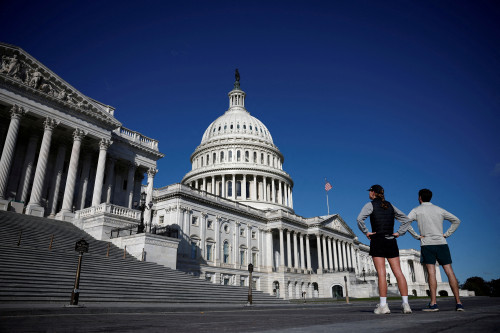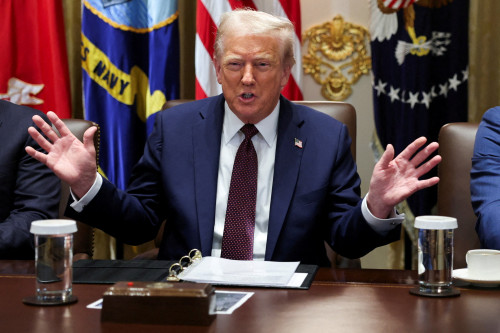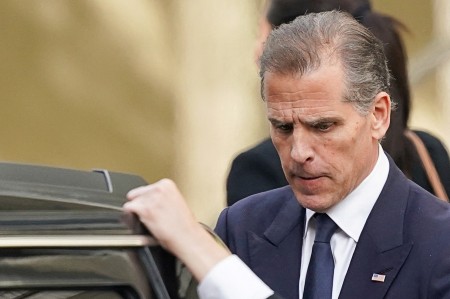By Bo Erickson and Richard Cowan
WASHINGTON (Reuters) -The U.S. House of Representatives on Wednesday passed a budget plan that lays the groundwork for extending President Donald Trump’s 2017 tax cuts, despite opposition from all Democrats and two Republicans who worried that it does not cut spending sufficiently.
The 216-214 House vote is a preliminary – but required – step that would enable Republicans to bypass Democratic opposition and pass tax cut legislation along party lines later this year.
Republicans will fashion those tax cuts over the coming months.
The legislation passed on Thursday amounts to a broad budget blueprint, which includes few details.
It would cut taxes by about $5 trillion and add approximately $5.7 trillion to the federal government’s debt over the next decade.
House Speaker Mike Johnson had hoped to pass it on Wednesday, but postponed action when some of his Republicans objected that it does not cut spending enough. With a 220-213 majority, Johnson has little margin for error.
The legislation, which passed the Senate on Saturday, calls for a minimum of $4 billion in spending cuts. That is far less than a previous version approved by the House that mandates $1.5 trillion in cuts.
Senate Republicans say the $4 billion figure is simply a minimum that does not prevent Congress from passing much larger tax cuts in the months to come. But some hardline conservatives in the House say they are reluctant to vote for legislation that does not include a bigger target.
Johnson and Senate Majority Leader John Thune tried to overcome those concerns ahead of the vote, saying they would aim to find much larger spending cuts in the months to come.
“We’ll certainly do everything we can to be as aggressive as possible,” Thune said.
Before the vote, some Republicans said they needed to set aside ideological concerns to give Trump’s tax cuts a chance of success.
“I don’t care how philosophically principled you are, I don’t care how bold and dramatic the legislation is, if it never makes it to the President’s desk, it’s never going to become a law,” Republican Representative Frank Lucas of Oklahoma said.
Trump urged House Republicans to vote yes.
“Great News! “The Big, Beautiful Bill” is coming along really well. Republicans are working together nicely. Biggest Tax Cuts in USA History!!! Getting close,” he wrote on social media.
The bill would extend the 2017 tax cuts that were Trump’s primary first-term legislative achievement.
He has also proposed additional tax breaks for overtime wages, tipped income and Social Security benefits. Nonpartisan analysts say that could drive the bill’s cost north of $11 trillion.
Congressional Republicans also intend to use the budget blueprint to raise the federal government’s debt ceiling, which they must do by sometime this summer or risk default on the nation’s $36.6 trillion in debt.
The intra-party fight comes amid chaos in financial markets set off by Trump’s imposition of tariffs on imported goods. Prospects of a shrinking U.S. economy as a result of a world trade war, as some economists have projected, spilled over into Congress’ budget debates because of the possibility of falling revenue in an economic downturn.
(Writing by Andy Sullivan; Editing by Scott Malone, Mark Porter and Alistair Bell)





